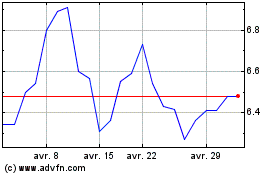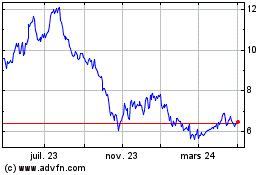Car Suppliers Vie for Major Role in Self-Driving Boom
09 Janvier 2017 - 6:18PM
Dow Jones News
By Tim Higgins
As a retrofitted self-driving SUV navigated through busy traffic
in Las Vegas last week, one of its passengers was trying to
position his company, auto-parts supplier Delphi Automotive PLC, at
the forefront of the autonomous-vehicle craze.
"The discussion is shifting over from the hypothetical to, 'how
is it actually going to be deployed?'" said Glen DeVos, Delphi's
vice president of services, at last week's CES 2017 tech expo,
where it demonstrated its self-driving technology including
cameras, laser sensors and artificial-intelligence software.
Myriad suppliers, from longtime auto-parts powerhouses such as
Delphi -- a provider of powertrains and safety systems -- to chip
makers like Nvidia Corp., are vying to become sellers of something
more than commodity parts.
As car companies showcase futuristic plans for their driverless
cars at the North American International Auto Show in Detroit this
week, they are weighing how much of the vehicles they can own
themselves, and how much they will need to rely on a widening group
of auto suppliers and tech companies.
"This is as transformative to the automotive space as the
internal combustion engine or the electric starter," said Delphi's
Mr. DeVos, whose autonomous system is slated to be available for
car companies in 2019.
The rise of autonomous vehicles may create a $20 billion global
market for sensors, software and systems used in such vehicles by
2020, according to AlixPartners, a consulting firm.
The opportunity is driving deals within the supplier community.
Delphi last week said it would buy Movimento, a software company
that specializes in over-the-air updates. Qualcomm Inc. is buying
NXP Semiconductors NV , the largest maker of chips for cars, for
$39 billion. And Samsung Electronics is paying $8 billion for
Harman International Industries Inc. -- a maker of
car-entertainment systems, car software and connected-car platforms
-- a move that instantly turns it into one of the top auto
suppliers.
"The value-add is shifting toward the smarts" of the car, Dinesh
Paliwal, the chief executive of Harman, said, recounting a recent
conversation with a senior executive of a large auto maker who said
the car companies are only responsible for 20% of the value added
to a vehicle.
With auto makers from Nissan Motor Co. to Ford Motor Co. aiming
to put self-driving cars on roadways by 2020, they must figure out
how to industrialize such technology now, given it takes several
years to develop vehicles.
The debate within the industry is over which companies will
control development of the car's brain. Will the auto maker develop
it? Or will it come from a tech player, such as Alphabet Inc.'s
Waymo, Uber Technologies Inc. or a startup like nuTonomy? Or will
traditional auto suppliers, such as Delphi, with experience in
buying components from other suppliers and packaging them for auto
makers, have a role?
"We think it's crucial technology to own and understand and
develop ourselves," said Ola Källenius, head of Daimler AG's
Mercedes-Benz development. "And, in this case, assembling line
code, as opposed to assembling pieces of metal."
The challenge for these companies is being nimble enough to
recruit top talent and develop breakthroughs in artificial
intelligence that can make a car understand the complexities of the
roadway.
Auto suppliers argue they have the experience of providing
automotive-grade technology to car makers. French supplier Valeo SA
said last week it developed technology for an autonomous car that
circled the U.S. last year, driving 13,000 miles, mostly in
automated mode -- but with a human in the driver's seat at all
times. "The basis of autonomous cars is sensors, and that is our
world," said Chief Executive Jacques Aschenbroich in Las Vegas last
week.
Valeo's miles, however, still pale in comparison to what
Alphabet's Waymo has achieved. Its cars have logged more than 2
million miles of autonomous driving on public roads in the past
eight years.
Waymo, which was spun off from Google into its own business unit
late last year, is working to commercialize the technology. Honda
Motor Co. recently said it was in talks with Waymo to test the tech
company's self-driving system in its vehicles.
In a keynote speech opening the Detroit auto show on Sunday,
Waymo Chief Executive John Krafcik announced the company developed
a platform of sensors to run its autonomous car software.
This "will allow us to deliver products and services that make
getting around safe and easy for everyone," he said. "Some of these
we may do on our own; some we may work on with partners."
Write to Tim Higgins at Tim.Higgins@WSJ.com
(END) Dow Jones Newswires
January 09, 2017 12:03 ET (17:03 GMT)
Copyright (c) 2017 Dow Jones & Company, Inc.
Valeo (PK) (USOTC:VLEEY)
Graphique Historique de l'Action
De Avr 2024 à Mai 2024

Valeo (PK) (USOTC:VLEEY)
Graphique Historique de l'Action
De Mai 2023 à Mai 2024
